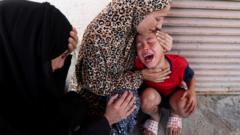Prime Minister Netanyahu called on citizens to vote for Yuval Raphael, showcasing the intersection of politics and culture as Israel sought a triumph at Eurovision despite ongoing military tensions.
Israel's Eurovision Entry: A Political and Cultural Endeavor

Israel's Eurovision Entry: A Political and Cultural Endeavor
Amid ongoing conflict, Israel rallied support for its Eurovision contestant through governmental and social media efforts.
In an intriguing intersection of culture and politics, Israel's Prime Minister, Benjamin Netanyahu, amplified efforts to garner support for the country's Eurovision representative, Yuval Raphael, during the contest’s final held last weekend in Basel, Switzerland. Just moments before Raphael took the stage, Netanyahu leveraged his 1.5 million Instagram followers with a fervent appeal: “Vote #04 — New Day Will Rise,” urging fans to make the maximum vote of 20 times allowed by Eurovision's rules.
This push came during a tense moment, as Israel was mobilizing military forces in Gaza and engaging in complex cease-fire negotiations with Hamas. The surreal nature of Netanyahu’s intervention, amidst a backdrop of military conflict, is emblematic of Eurovision's growing significance for the Israeli government, especially in light of artistic boycotts faced by Israeli performers due to ongoing political strife.
The government’s support for Raphael extended beyond social media to campaigns involving emails and YouTube advertisements aimed at bolstering the Israeli contestant's visibility. Despite regional turmoil, Israel achieved the highest public vote at the competition’s conclusion, creating a dramatic finale as anticipation built through the voting process. Just before results were finalized, Austria surged ahead through juried votes, capturing the title and thwarting Israel’s hopes for victory, leaving many to reflect on the poignant mingling of entertainment and national identity.




















